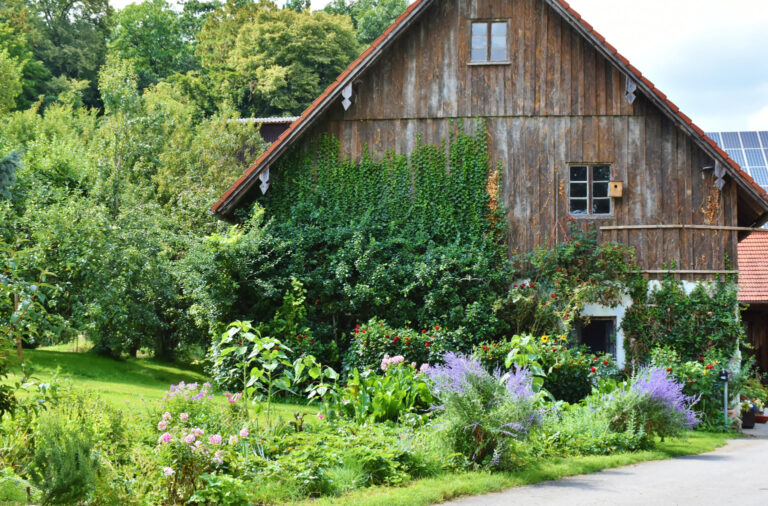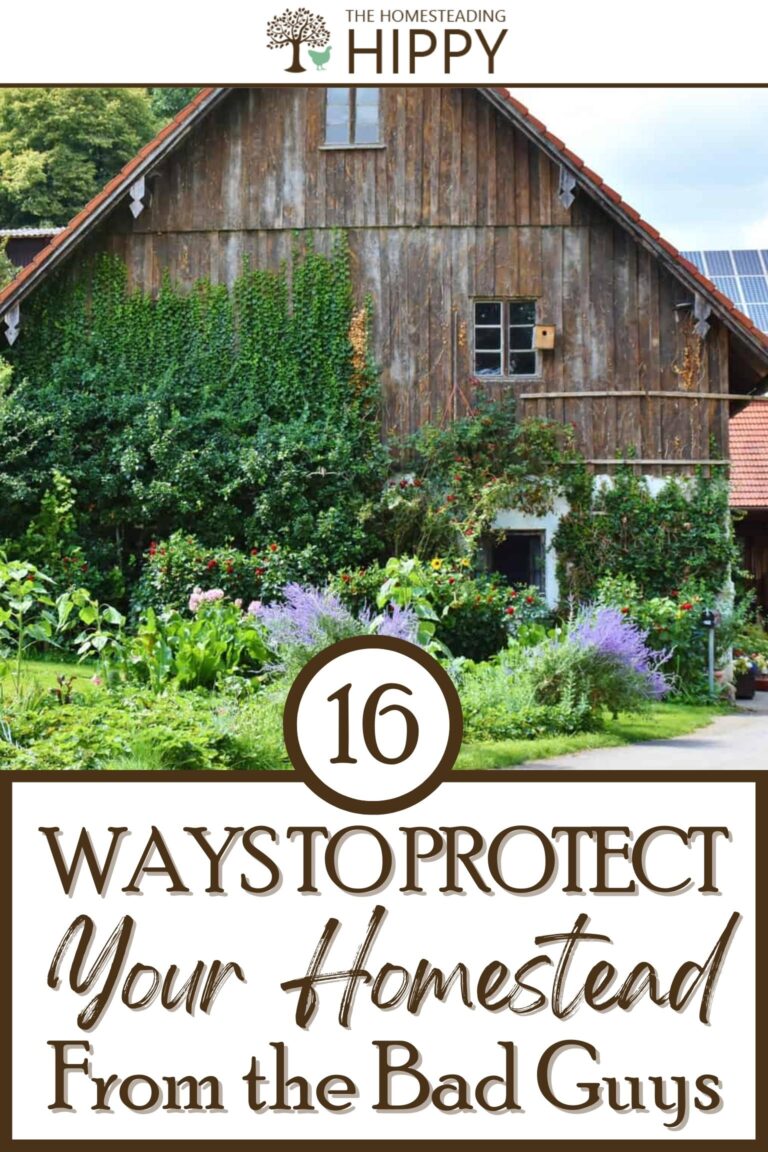Life is full of surprises and not all those surprises are of the pleasant sort. Some of those surprises can lead to some rather nasty situations, and when you’re living on a homestead off the grid those situations can escalate quickly.

This makes protecting your homestead from intruders crucial.
So, how do you protect your homestead from those intruders who may try their luck? Well, that’s what we’re going to look at now.
1. Know Your Enemy
Okay, so let’s get this out of the way; you can’t really know what’s going on in an intruder’s head.
There are, however, certain things for which you can prepare. Look at your land and consider that most intruders/criminals are opportunists.
Every intruder that you encounter will have different motives ranging from minor burglaries to more serious offenses (i.e. aggravated assault).
When it comes to a homestead, of course, there are a few things that could draw an unwanted visitor or two. Some possible lures include:
- Tools/equipment: they’re either taking tools and equipment to use or making a few bucks by selling them.
- Crops/animals: maybe they’re down on their luck and just need some food.
- Fuel: If they fuel for anything (cooking, heat, etc.) then your fuel supply is a hot item – no pun intended.
- Jewelry and valuables: these pretty baubles can fetch a nice price in some cases which is why they’re also frequent targets.
- Weapons and ammunition: these are obvious targets that usually make their way to the top of the ‘I don’t want the bad guys to get this list. You’re off the grid in the middle of nowhere, human predators aren’t the only predators to worry about.
You can’t plan for everything, but you should at least be able to deal with the situation accordingly.
2. Know Your Surroundings
One of the most important aspects of protecting yourself and your property is knowing what’s where.
Knowing where all the possible entry points are in your home/on your land (i.e. the most likely places of entry for burglars) allows you to put deterrents in place to keep the bad guys out.
Knowing your surroundings also applies to knowing where your weapons are and where you’re going to make your escape if/when necessary.
Running away is an acceptable option. When it comes to your escape routes, you should always know the lay of the land.
You need to know what landmarks are around and where the land can be used by or against you is important so that you don’t end up stepping into a hole or walking into a poisonous plant – especially at night when visibility is often poor.
It also makes it easier for you to get help when needed. Knowing the lay of the land also helps when it comes to supply lines.
Having caches of food and other supplies placed in strategic locations is helpful when you need to stay out in the bush for prolonged periods.
3. Strong, Sturdy Fencing is Crucial
Fencing is an important part of keeping your livestock safe from predators. When you think about it, we are the prey and the bad guys the predators.
If we want to keep ourselves safe, we’d best set up the strongest, sturdiest fences around our homes to keep any unwanted, uninvited, guests.
4. Security Cameras can be Useful
We’ve all seen those trail cameras used by park rangers and hikers to track animals in the wilderness, right?
This is the same deal, the difference here is that instead of wild animals, you’re watching for bad guys.
A security camera system can include lights and alarms which can be used to scare off possible intruders but the cameras themselves will give you the time you need to get to safety if/when needed.
5. Motion Sensors and Security Lights
Motion sensors can be linked to cameras, security lights, and/or alarms; the idea is that something moves in front of the sensor, and it sets off whatever security measures you’ve connected to them.
6. Cover Up your Windows
Window shopping is something that we all do regularly when we go to the local malls. Now, I know what you’re thinking; bad guys don’t do window shopping.
Well, you’d be wrong; how do they decide what’s worth taking?
They look through the windows, see what looks valuable, and decide what to grab and when they can get it. Stopping this from happening is pretty simple; cover up your windows.
7. Lock Up
I know it seems obvious but please lock your barns and tool sheds properly.
You wouldn’t leave your home unlocked at night, so don’t leave your barn or any outbuildings unlocked either.
Use concealed storage (i.e. cubby holes) to keep all your more dangerous tools and equipment out of sight.
8. Double, Triple, and Quadruple Check EVERYTHING
Speaking of locks, this is very important; check everything and make sure that everything is locked up safe and sound. This is especially important when it comes to your tools and weapons.
9. New Windows for the Win!
Windows are…fragile. They’re easily broken and/or forced open, this can cause serious problems – especially for homesteaders who are out in the wild far from immediate aid.
So, how do we fix this issue?
Well, put in new windows for a start. Newer windows typically have reinforced panes so they’re harder to break and are fitted with sturdy locks to keep out any unwelcome guests.
10. Gain the High Ground
No, I’m not doing the Star Wars joke; forget it. Gaining the high ground puts you in a superior position to your intruders. For one thing, you could probably see them before they see you.
Staircases are notoriously narrow, meaning that there’s nowhere for them to go but up or down if you start raining chaos (i.e. gunfire, paint cans, etc.) on them. I mean, haven’t you seen Home Alone?
11. Makeshift Tripwires
A bit of rope, string, or fishing line can make a fairly good tripwire which you can rig to set off an alarm of some sort (i.e. jingling cans, knocking something heavy over to make a noise).
You can obviously also set it up so that the intruder trips over the line – if they fall, you’re very likely to hear it.
12. Certain Plants can be VERY Unpleasant
Have you ever listened to those Pro Revenge stories on YouTube? They usually cover a genius revenge plan to…well…take revenge on someone.
Well, I read a story at one point about a teacher who, to stop students from destroying plants, left poison ivy in his class with clear markers to say don’t touch – as you may have guessed, some students destroyed the plant.
To avoid being found out, these students stuffed the plant into their underwear. As you can imagine, the results weren’t too pleasant.
I’ve also heard of people who plant cacti in their gardens. Of course, when the burglar/prowler jumps over the wall/fence they get some of those nasty cactus thorns in their…erm…sensitive areas.
Another plant that could be a deterrent to intruders is the Australian Gympie Gympie plant. It’s got a nasty sting that causes excruciating pain for the sufferer. How do you get stung?
Well, the leaves are covered in very fine, and very brittle hairs that are so fragile that they’ll break off at the slightest touch. Oh, and these hairs are also full of toxins – lovely.
When these things become embedded in your skin, it can be difficult and, in some cases, flat out impossible to remove them.
The pain can last for anywhere from several weeks to months. So, if it’s native to Australia what’s it doing on this list? It’s not like it’ll get through the Australian customs people, right?
Well, Australia does have some strict import/export laws and they don’t mess around with them, but this is one of those plants that a lot of people think of when it comes to unpleasant plants.
If you have kids and/or pets or livestock, this is a very risky plant to have on your land. Imagine trying to treat a two-year-old who accidentally brushed against this thing.
13. Do Regular Head Counts of your Animals
Doing a regular headcount (i.e. once or twice a week) allows you to stay on top of things. You know exactly how many animals you should or shouldn’t have in your paddock or chicken coop.
14. Immediately Report ANY Missing Animals to Local Authorities
The longer the delay, the harder it’ll be to recover the animal. If any of your animals go missing, report it to the local authorities so that they can get the ball rolling and try to get your missing cattle, chickens, etc. back for you.
All too often – especially over the last few years – we’ve seen a lot of people fighting against the police/law enforcement instead of helping them.
This is going to slow the process of recovering your stolen animals and/or property.
15. Mark Your Animals
We’ve all heard of tagging and microchipping animals, right? It helps to keep track of where they are and, in some cases, what they’re doing.
Marking an animal with a tag is easy enough but there’s a chance the tag could be removed.
Tattooing or branding is a better option, as the marks are clearly visible and make the animal easy to identify.
16. Prevent Loitering
It may sound kind of silly, but don’t let strange people loiter on or around your homestead and animals. They may be casing the place out to see what, if anything, they can take easily.
This is particularly true when it comes to animals as they’re somewhat easier to deal with than people.
You are Your Own First Responder
“You hope for the best, prepare for the worst.” – Old Proverb
You are your own first responder; I heard this phrase when I was around 13-ish and I didn’t know what it meant at the time.
As I’ve gotten older, however, my understanding of things has obviously changed. You can’t rely on some comic book superhero to save you in your hour of need, you need to be able to deal with the situation to the best of your ability and prevent things from escalating.
There are many ways to keep your homestead and loved ones safe and I hope that this article has helped you all out.
Feel free to share some of your own safety tips, I’d love to read about them. As always, thanks for reading and I’ll see you all again in the next article. Take care, and stay safe!


Greg spent most of his childhood in camping grounds and on hiking trails. While he lives in the suburbs nowadays, Greg was raised on a small farm with chickens. He’s a decent shot with a bow, and a huge knife enthusiast. Find out more about Greg.

Another possibility is the bad guy/guys are looking for a new place to occupy……….especially if the cities get too hot. Not always about liberating your stuff…….sometimes its a new hideout they seek.
Hi Greg ..
Good advices!!
17) Guinea fowl
18) Dogs